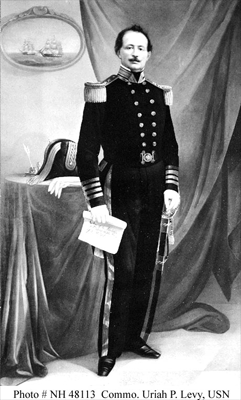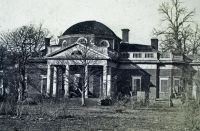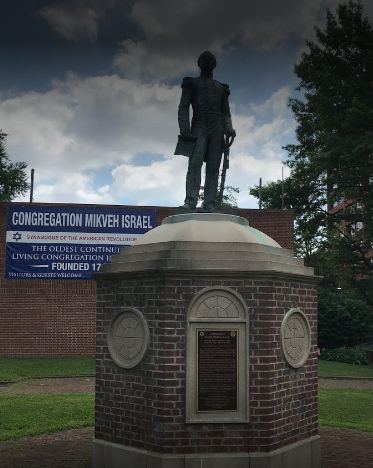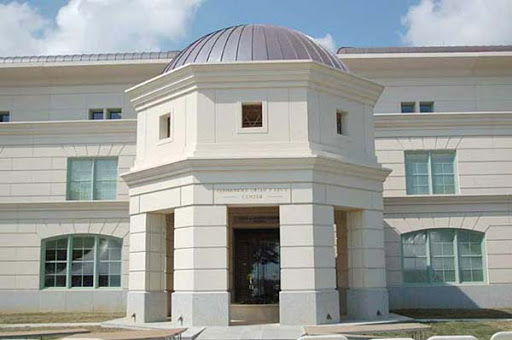Uriah Levy: The Sephardic Jewish Navy Commodore Who Saved Thomas
Jefferson’s Monticello
by Marc Leepson*

One of the great historic preservation stories in U.S. history also happens to be an important, but little-known story of Sephardic Jewish-American history: how Uriah Phillips Levy and his nephew, Jefferson Monroe Levy, saved Thomas Jefferson’s Monticello from ruin on two different occasions. It is not an exaggeration to say that without the Levys’ eighty-nine year stewardship of Jefferson’s “Essay in Architecture,” Monticello in Charlottesville, Virginia, easily would not have survived to become the iconic historic house museum that it is today.
 Circa 1870 photo of Monticello, UVA Alderman Library,
Special Collections
Circa 1870 photo of Monticello, UVA Alderman Library,
Special CollectionsWhen he purchased Monticello in 1834, then U.S. Navy Commodore Uriah Levy immediately set about repairing, restoring, and preserving the property, which, as a visitor at the time noted, was “in dilapidation and ruin” after years of neglect owing to Thomas Jefferson’s precarious financial condition in his later years. The nation’s third president and the author of the Declaration of Independence died with more than $107,000 in debt on July 4, 1826. Levy’s nephew Jefferson M. Levy, a wealthy New York lawyer and real estate and stock speculator, acquired the estate in 1879 seventeen years after his uncle’s death in 1862. It had again fallen into near ruin following Uriah Levy’s death and the subsequent seventeen year fight over his will that left the place in limbo. Jefferson Levy, emulating what his uncle did forty years earlier, spent a small fortune restoring and preserving Monticello.
Uriah Levy, who was born in Philadelphia in 1792, was a fifth-generation American from an illustrious Jewish-American family. His great-great grandfather, Dr. Samuel Nunez, was among a group of forty-two Sephardic Jews who fled the Inquisition in Lisbon and were among the founders of Savannah, Georgia, in 1733. Dr. Nunez was the first, and for many years, the only physician in the entire Georgia Colony. In December 1733, he was given credit by Governor James Oglethorpe for stemming an epidemic of what most likely was cholera.
Not long after the Nunez family arrived in Savannah, their oldest daughter, nineteen year- old Maria Caetana Nunez (known as Zipporah), married David Mendes Machado. He also was among the first group of Jews who came to the Georgia Colony. Less than a year after the wedding, David and Zipporah Machado moved to New York City. They went north after David Machado was appointed hazzan at Congregation Shearith Israel, the Spanish and Portuguese Synagogue, the first Jewish congregation established in North America. David and Zipporah had two children. The oldest, Rebecca was born in 1746. Eleven days before her sixteenth birthday, on November 10, 1762, she married Jonas Phillips.
Twenty-one year old Jonas Phillips had arrived in the colonies from Germany in 1756, and soon became a prominent merchant and patriot. He joined the Philadelphia Militia during the Revolutionary War and later petitioned the Continental Congress for religious freedom in the fledgling republic. One of his daughters, Rachel Phillips, married German Jewish immigrant Michael Levy in Philadelphia in 1787. Levy family tradition holds that George Washington attended the wedding.
Michael and Rachel Levy’s son, Uriah, grew up in Philadelphia when that city was a thriving seaport. His patriotic grandfather, Jonas Phillips, was an early and important influence on him. Growing up, Uriah idolized George Washington and John Paul Jones, the Revolutionary War naval hero who died three months after Uriah was born.
The family story holds that Uriah ran away from home at age ten to be a cabin boy on a ship and that he came home three years later for his bar mitzvah. At nineteen, Uriah Levy was part owner of a merchant ship. He joined the U.S. Navy a year later in 1812, to fight against the British; he served with distinction in the War of 1812 as assistant sailing master of the Argus. He went on to become the first Jewish-American to make a career as a U.S. Navy officer. When Uriah Levy died in service in 1862, he was the Navy’s first commodore, the highest rank at the time.
Uriah Levy had moved permanently to New York City in 1828. Although he had no formal education, he began investing in real estate and bought three rooming houses in Greenwich Village, two on Duane Street and one on Greenwich Street. Thereafter, he specialized in acquiring rooming houses in the Village and elsewhere in Lower Manhattan. He made a small fortune.
Levy was an ardent admirer of Thomas Jefferson. In 1832, while on a trip to Paris, he met the noted French sculptor Pierre-Jean David d’Angers and commissioned him to create a full- scale bronze statue of Thomas Jefferson, which stands in the Capitol Rotunda in Washington, D.C. It is the only work in the U.S. Capitol donated by a private citizen. On February 6, 1833, Levy presented a painted plaster model of the statue to the City of New York; it was placed on the second floor of the rotunda at City Hall. In appreciation, the city gave Levy the “Freedom of the City” and a gold snuffbox. The statue was moved into the ornate City Council chamber in the 1950s.
Uriah Levy wasn’t Jonas Phillips’ only grandson who had a connection to Thomas Jefferson. A second cousin, Mordecai Manuel Noah, a well-known diplomat and journalist, was the recipient of a famous letter from Jefferson. In 1818, Noah gave a speech at Shearith Israel in New York, a copy of which made its way to Monticello. Jefferson wrote to him on May 28, 1818, saying that he had read the speech “with pleasure and instruction, having learnt from it some valuable facts about Jewish history which I did not know before. Your sect by its sufferings has furnished a remarkable proof of the universal spirit of religious intolerance, inherent in every sect, disclaimed by all while feeble, and practised by all when in power. Our laws have applied the only antidote to this vice, protecting our religious as they do our civil rights by putting all on an equal footing, but more remains to be done.” (Thomas Jefferson Papers, Series 9.)
Uriah Phillips Levy made a name for himself as an important figure in American naval history. Along with his courageous service in the War of 1812, he is best known for his fight for the abolition of flogging in the U.S. Navy. He also overcame more than his share of anti- Semitism to attain the Navy's highest rank. He won a place of honor in Jewish-American history for resisting and defeating a vicious anti-Semitic climate in the U.S. Navy and for his continuous strong defense of his faith throughout his life. “My parents were Israelites,” Uriah Levy said in 1857. “I was forced to encounter a large share of the prejudice and hostility by which, for so many ages, the Jew has been persecuted.” (Defense of Captain Uriah P. Levy, p. 13.)
In June, 1816, Lt. William Potter challenged him to a duel after an altercation at the Philadelphia Patriot’s Ball during which Potter called Levy a “damned Jew” and Levy responded physically. The duel took place across the Delaware River in New Jersey. Potter, the story goes, fired four times and missed Levy, who responded each time by purposely firing into the air. After Potter’s fifth shot, Levy shot Potter in the chest, killing him on the spot. Uriah Levy was brought to trial after the duel and was acquitted of murder in Philadelphia County Court.
In 1855, Levy, along with many other naval officers, was dropped from the U.S. Navy’s active duty lists. He did not take the news well and decided to fight his removal from the Navy. His defense was based on anti-Semitism. Levy put together a vigorous case with the help of an old friend, the influential New York lawyer and former U.S. Attorney General, Benjamin Franklin Butler. Some have compared Levy’s case to the 1894 Dreyfus Affair in France. The Jewish French Army Captain Alfred Dreyfus was convicted of treason and sentenced to life imprisonment at Devil’s Island in a court-martial marked by overt anti-Semitism. The case became a political cause célèbre in France.
It may be a stretch to compare the two cases, but Levy and Butler put together an impressive array of witnesses to testify on Levy’s behalf at a Navy Court of Inquiry in November 1857, in Washington, D.C. They brought in thirteen naval officers and government officials to help make his case. The month-long proceeding was heavily covered in the nation's newspapers. Uriah Levy himself contributed significantly to his case with a passionate speech, the transcript of which runs to one hundred and fifteen pages.
“My case is the case of every Israelite in the Union,” Levy said. “Are the thousands of Israel and the tens of thousands of Judah, in their dispersion throughout the earth, who look to America as a land bright with promise, are they now to learn, to their sorrow and dismay, that we too have sunk into the mire of religious intolerance and bigotry?” (ibid.)
Levy and Butler won their case. Uriah Levy was reinstated on the active duty rolls of the U.S. Navy on January 29, 1858. Less than three months later he was given command of the USS Macedonian.
In the early 1850s, Uriah Levy began a campaign to abolish the use of flogging in the Navy. He wrote articles in New York, Philadelphia, and Washington, D.C. newspapers, pushed the message with a series of lectures; he was joined in his campaign by Herman Melville, the celebrated author of Moby Dick. They succeeded in 1853, when the U.S. Navy banned the practice of flogging. Congress made it official in 1862, the year Levy died.
Levy married late in life and died childless in 1862. He left a convoluted will that his heirs challenged in court. Seventeen years of legal wrangling ensued, during which time Monticello again fell into near ruin. In 1879, Jefferson Monroe Levy, a twenty-seven year old lawyer and the son of Uriah’s youngest brother, Jonas, made an agreement with the other heirs to buy Monticello for $10,500. He carried on his uncle’s legacy and once again a member of the Levy family returned the estate to its original state.
In conclusion, Uriah Philips Levy was “an ardent advocate of religious freedom, and he bought and preserved Monticello in 1834 to preserve this home, preserve Jefferson’s legacy for the future,” said Susan Stein, Monticello’s long-time curator. “Monticello survives today, almost two hundred years after Thomas Jefferson’s death in 1826 thanks to the initiative of the civic- minded Levy Family.” (Quoted in Michael Bragg, “Honoring religious liberty’s roots at Monticello,” Charlottesville Daily Progress, May 7. 2017.
Uriah Levy is considered a genuine hero by the United States Navy. A Cannon class destroyer escort, the USS Levy, was commissioned in 1943, and served in the southern and central Pacific from August 1943, through the end of World War II. The first permanent Jewish Chapel built by the United States armed forces, the Commodore Levy Chapel at the Navy Station in Norfolk, Virginia, was dedicated in 1959. The Commodore Uriah P. Levy Center and Center and Jewish Chapel at the U.S. Naval Academy in Annapolis was dedicated in 2005. A full-length oil portrait of the Commodore is on display at the Naval Academy’s Museum. “The Levys’ dedication for nearly 90 years,” a plaque at Monticello notes, “preserved Monticello for future generations.”
References
“Defense of Captain Uriah P. Levy, U.S. Navy Before a Court of Inquiry, Convened in Washington, D.C. in November 1857, Defense Statement,” Levy, Uriah Phillips, 1792-1862, Library of Congress Miscellaneous Manuscripts Collection, p. 13.
Thomas Jefferson to Mordecai Noah, May 28, 1818, Library of Congress, Thomas Jefferson Papers, Series 9. Collected Manuscripts, 1783-1822.
* Journalist and historian Marc Leepson is the author of nine books, including Saving Monticello: The Levy Family’s Epic Quest to Rescue the House that Jefferson Built. His website is http://marcleepson.com.


